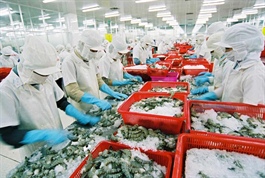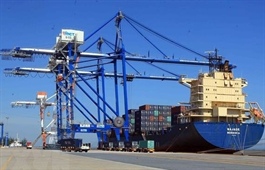Norway takes comparative advantages to develop Vietnam offshore wind industry
Norway takes comparative advantages to develop Vietnam offshore wind industry
Vietnam’s National Oil and Gas Group said Norwegian partners help it develop the offshore wind industry in terms of technologies and finance.
Norwegian largest energy company, Equinor, officially opens its representative office in Hanoi, reaffirming Norway’s willingness to contribute to the development of Vietnam’s offshore wind industry.
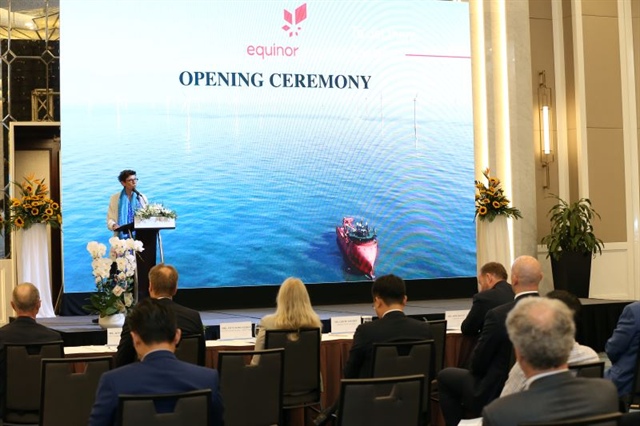
Ambassador of Norway to Vietnam Grete Løchen delivers speech at the opening ceremony of Equinor's office held in Hanoi on May 5. Photos: Embassy of Norway in Hanoi |
As one of theleading global energy providers, the presence of Equinor in the country marks an important milestone in the Norway-Vietnam business cooperation portfolio and reiterates Norway’s determination to be part of Vietnam’s green transition process and implementation of the Paris Agreement and the country’s commitments made in COP26, according to Ambassador of Norway to Vietnam Grete Løchen.
Ambassador Løchen called the opening of Equinor’s country office in Hanoi “a very big achievement”. Its vision to develop offshore wind in Vietnam will “definitely attract other Norwegian businesses to Vietnam” in addition to those who are investing and developing in the energy industry in the country, boosting the cooperation in this sector.
“We have to transform the way we produce and consume energy if we want to achieve the goals envisioned in the Paris Agreement and COP26. For this cause, Norway will continue its active engagement in international climate diplomacy and work towards further strengthening global cooperation in this process,” Ambassador Grete Løchen said at the opening ceremony of Equinor’s office in Hanoi on May 5.
“I think we have a lot of experience and knowledge to share with Vietnam. Both Norway and Vietnam are coastal nations and the ocean economy is so important to both countries,” Ambassador Løchen shared with The Hanoi Times. “Norway has a long history of offshore installation in oil and gas and lots of this technology and experience we can transfer to offshore wind and that’s why Equinor or a company like it is very well positioned to share their experience and technology with Vietnamese partners in unavoidable energy transition in Vietnam,” the ambassador added.
Norway will double its climate finance by 2026 including a plan for allocating NOK10 billion (US$1 billion) over five years to a new climate fund, which will be managed by Norfund, the Norwegian Fund for Developing Countries. It will then be made available for investment in renewable energy in developing countries like Vietnam. In Asia, Vietnam would be prioritized to get Norway’s assistance in green energy transition and greener energy mix, stated the ambassador.
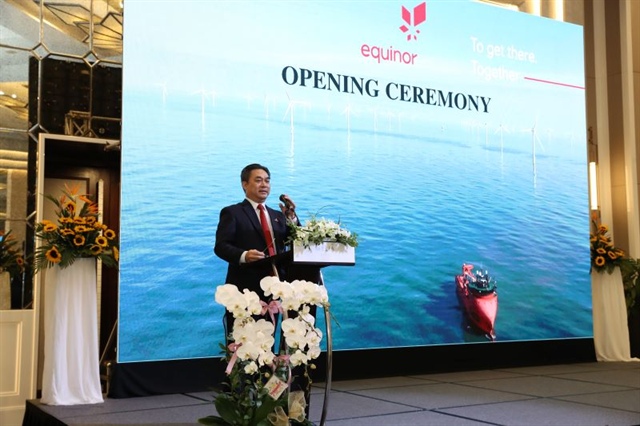
Pham Tien Dung, Vice President of Vietnam’s Oil and Gas Group (PetroVietnam), speaks at the event. |
Equinor: long-lasting partner in Vietnam energy industry
Addressing the event, Pham Tien Dung, Vice President of Vietnam’s Oil and Gas Group or PetroVietnam (PVN), said: “Equinor and PetroVietnam have many things in common as we are both state oil and gas corporations, which want to transform into energy companies. We very much value credibility, experience, expertise and technologies of Equinor in that transformation process.”
Equinor’s operations in Vietnam dated back to early 1990s when it joined BP plc in the Nam Con Son Gas Project in Ba Ria-Vung Tau Province.
For PetroVietnam, the national oil and gas corporation playing an important role in the country’s energy security, embarking on energy transition is indispensable and partnering with international experienced companies in the process becomes a right step forward, Dung told The Hanoi Times.
He said, to pursue Vietnam’s net zero journey until 2050, it’s crucial to seek foreign partners with advanced technologies and financial strengths to make the assistance stronger and broader, mostly in offshore wind power, which remains fledgling in Vietnam.
The support, coupled with better regulatory framework, would enable Vietnam to develop the potential wind industry and expand to projects abroad in the future, Dung added.
“To us, Equinor is the main and important partner in renewable energy portfolio particularly offshore wind,” he emphasized.
Founded in 1972 as the Norwegian State’s Oil & Gas Company (Statoil), Equinor has become an international company with operations in 33 countries and now is a leading company in the energy transition.
In its long history of offshore construction, Equinor develops the world’s first floating wind turbine, the world’s first full-fledged floating wind farm, and is rapidly gaining ground in the fixed offshore wind market with many large bottom fixed projects all over the globe, including in North and South America, Africa, Europe, and Asia.
In October 2021, Equinor, together with the Norwegian Embassy in Hanoi, completed a Vietnam Supply Chain Study Report and handed it over to Vietnamese Minister of Industry and Trade Nguyen Hong Dien right before his trip to COP26 with Vietnamese Prime Minister Pham Minh Chinh.
Together with its local partner, PVN, Equinor has applied for projects in five provinces in Vietnam namely Ba Ria – Vung Tau, Binh Thuan, Ninh Thuan, Haiphong, and Thai Binh.
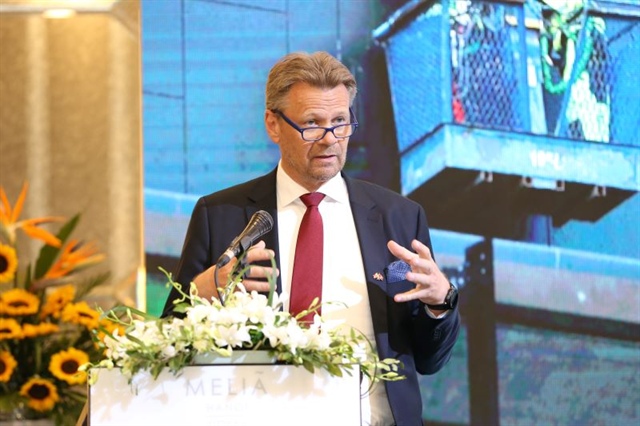
Equinor’s Senior Vice President Jens Olaf Økland at the opening ceremony. |
“We are looking forward to collaborating with PVN, a strong local partner, to assess the potential early and at scale in what could become a very interesting growth market for offshore wind. As companies, we have both a strong oil and gas background and the combination of PVN’s strong local presence with Equinor’s offshore wind experience, provides a solid starting point for growth and value creation,” said Equinor’s Senior Vice President Jens Olaf Økland.
In addition, Vietnam is one of the worlds’ fastest growing economies and power markets. With its long coastline and favorable wind conditions, the country has among the best wind resources in Asia and a strong desire to develop an offshore wind market, he noted.
“We believe Vietnam has high potential to become an interesting growth market for offshore wind. Equinor wants to take part in maturing the offshore wind industry in Vietnam and is therefore happy to establish local presence in Hanoi. Together with our local partners, our ambition is to utilize our offshore experience and broad energy competence to support Vietnam’s energy transition, paving the way for renewables growth”, Jens Olaf Økland talked with The Hanoi Times.
According to him, Norway has been actively supporting green transition efforts globally. Technically, they build on their world-leading competence and technology from the oil and gas industry in new sectors, including offshore wind power, hydrogen, carbon capture and storage, and green shipping.
With the establishment of its local presence in Vietnam, Equinor wants to use its experience and competence together with its local partner, PetroVietnam, to successfully develop Vietnam’s offshore wind industry by implementing successful offshore wind projects; improve local competence and capacity; build a strong local supply chain for offshore wind industry; create more skilled jobs locally; generate power at lower costs; gradually make renewable energy affordable for all; and assist Vietnam’s green transition agenda and implementation of its international commitments on climate and environment.
In detail, Jens Olaf Økland said Equinor has long experience moving in markets and developing the offshore industry together with governments and all stakeholders. Meanwhile, Vietnam has a very good starting point as it has a lot of experience in oil and gas exploitation which is a good foundation for both sides to conduct a supply chain.
He shared that it’s a bit early to tell on the timing of investment but obviously Equinor is very eager to contribute and participate in the offshore wind in Vietnam.
It’s also important to get a regulatory framework in place as investors always need predictability, he said, noting that Equinor is in a position where they have a very strong balance sheet so they will be able to finance those investments on their own.
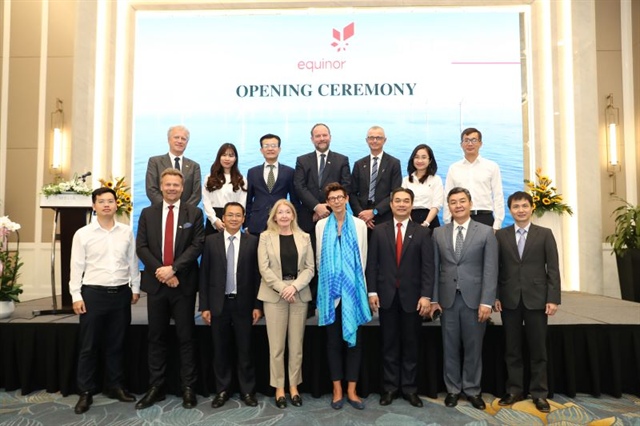
Ambassador Grete Løche with representatives of PetroVietnam and Equinor. |










